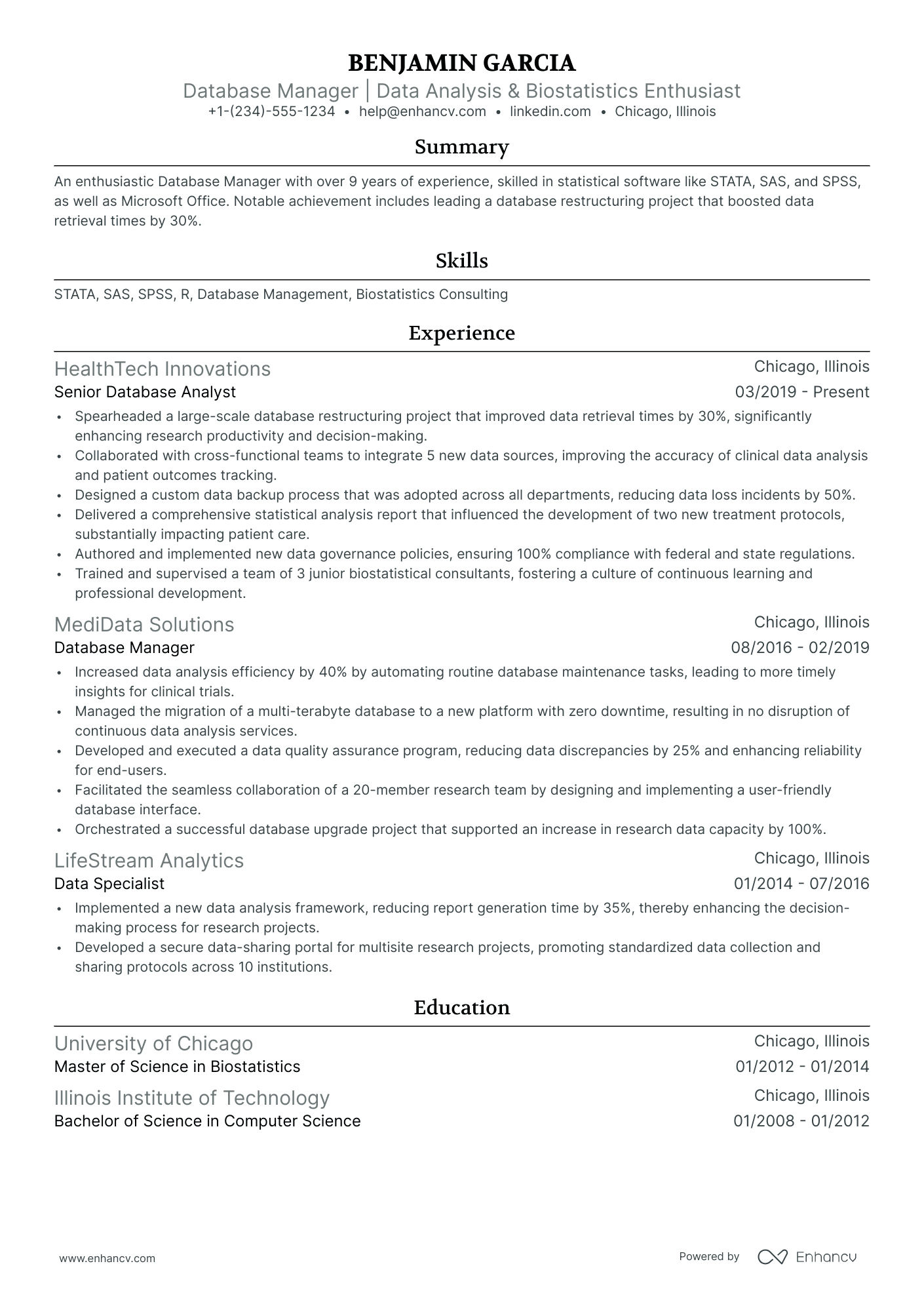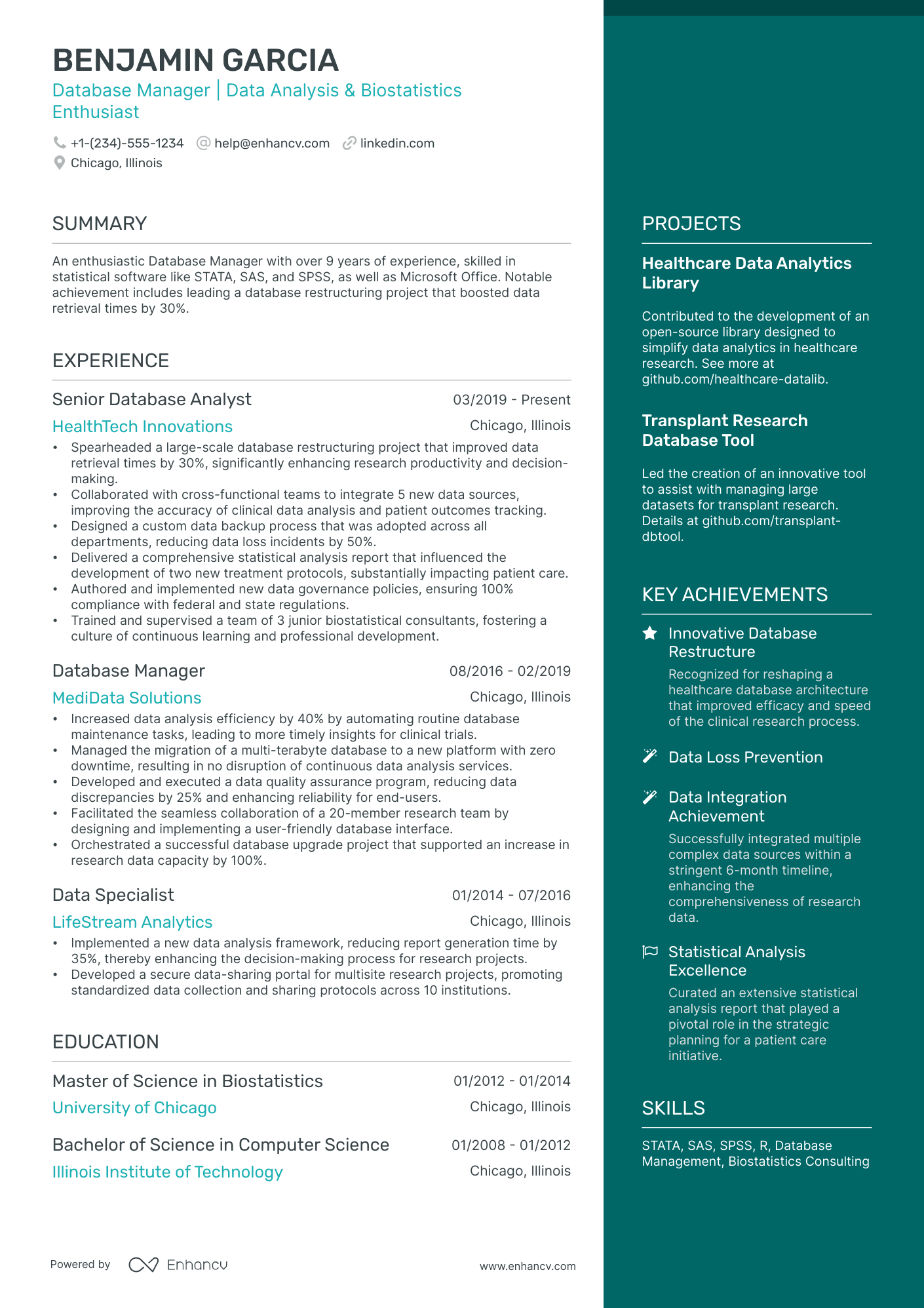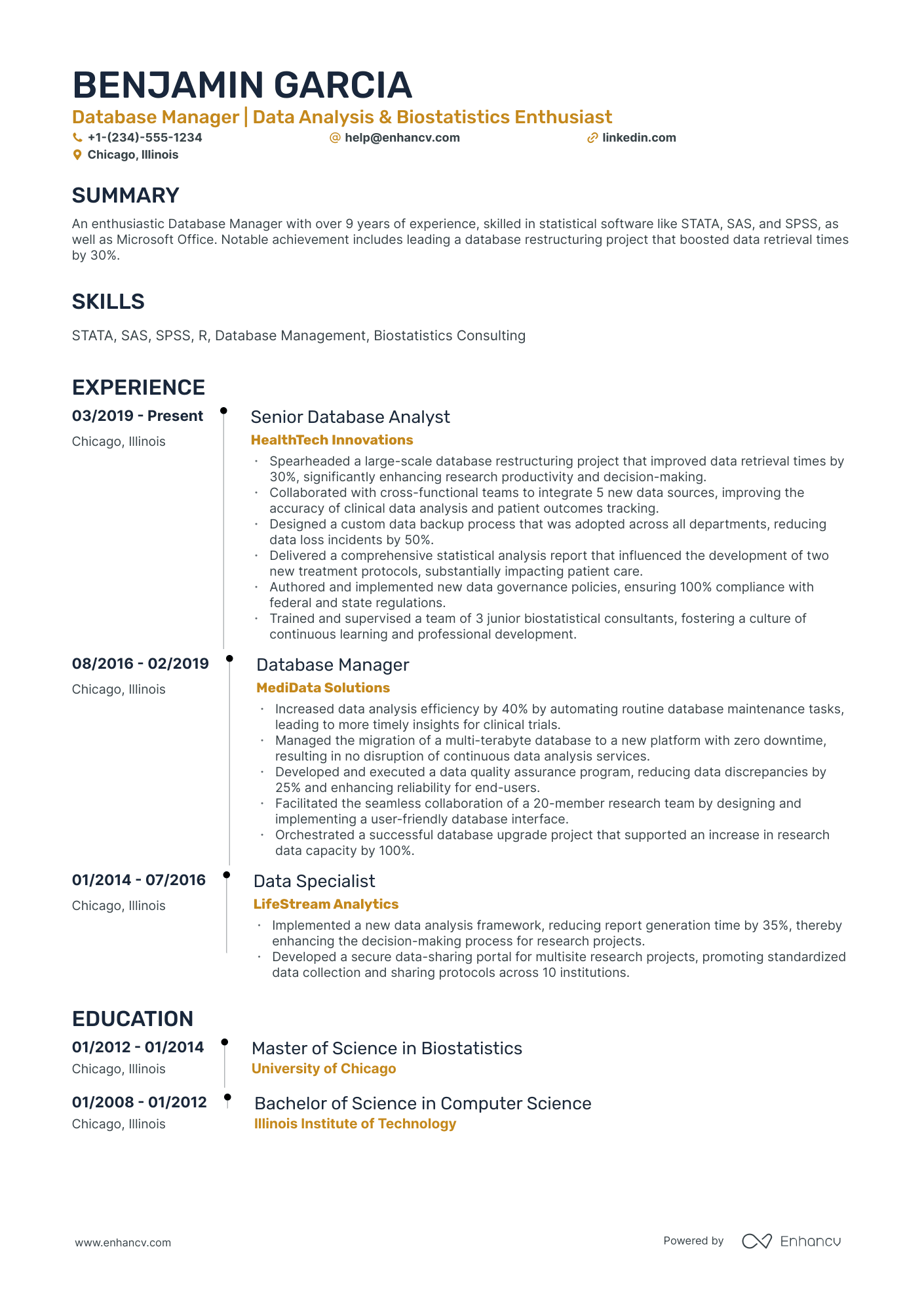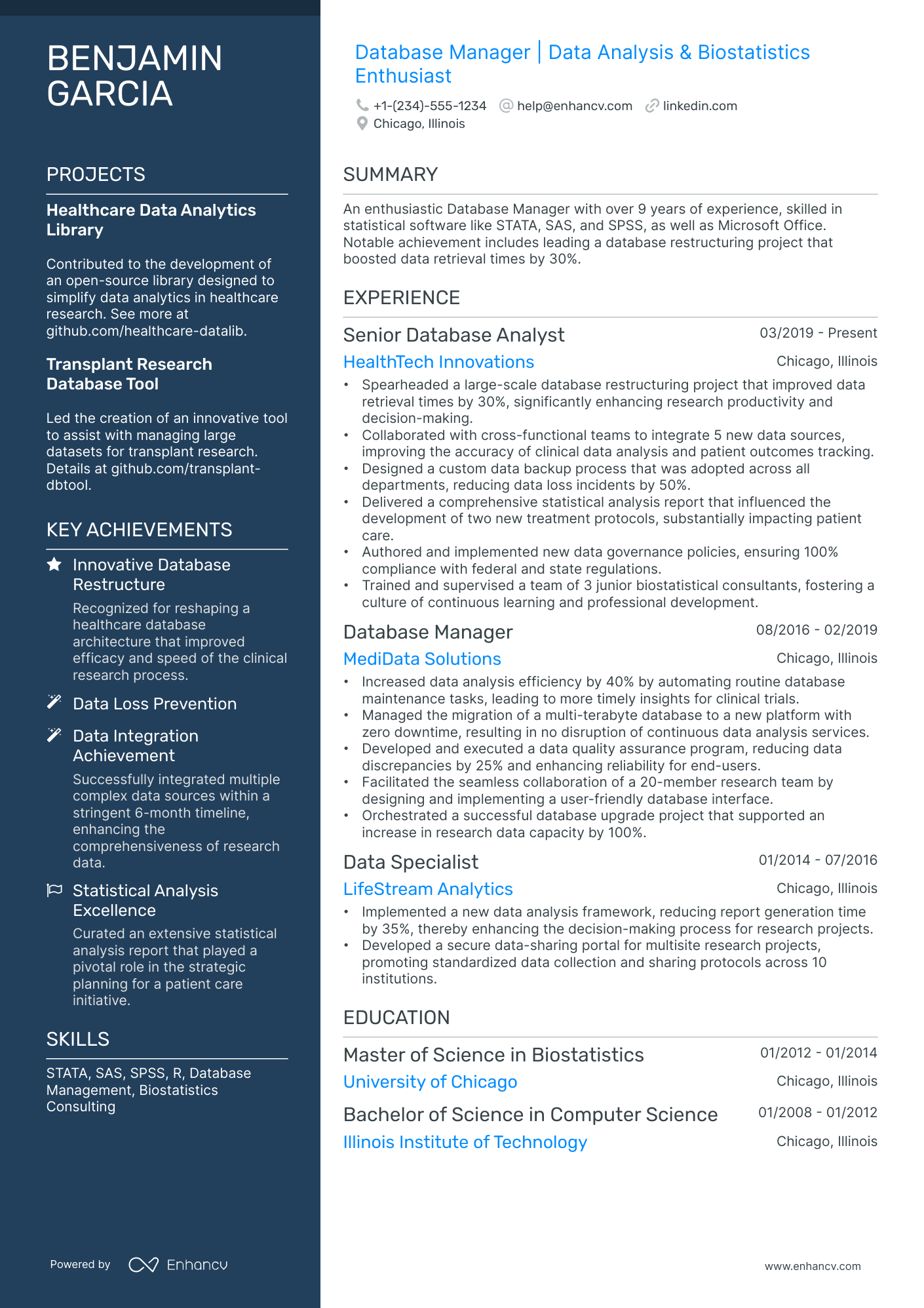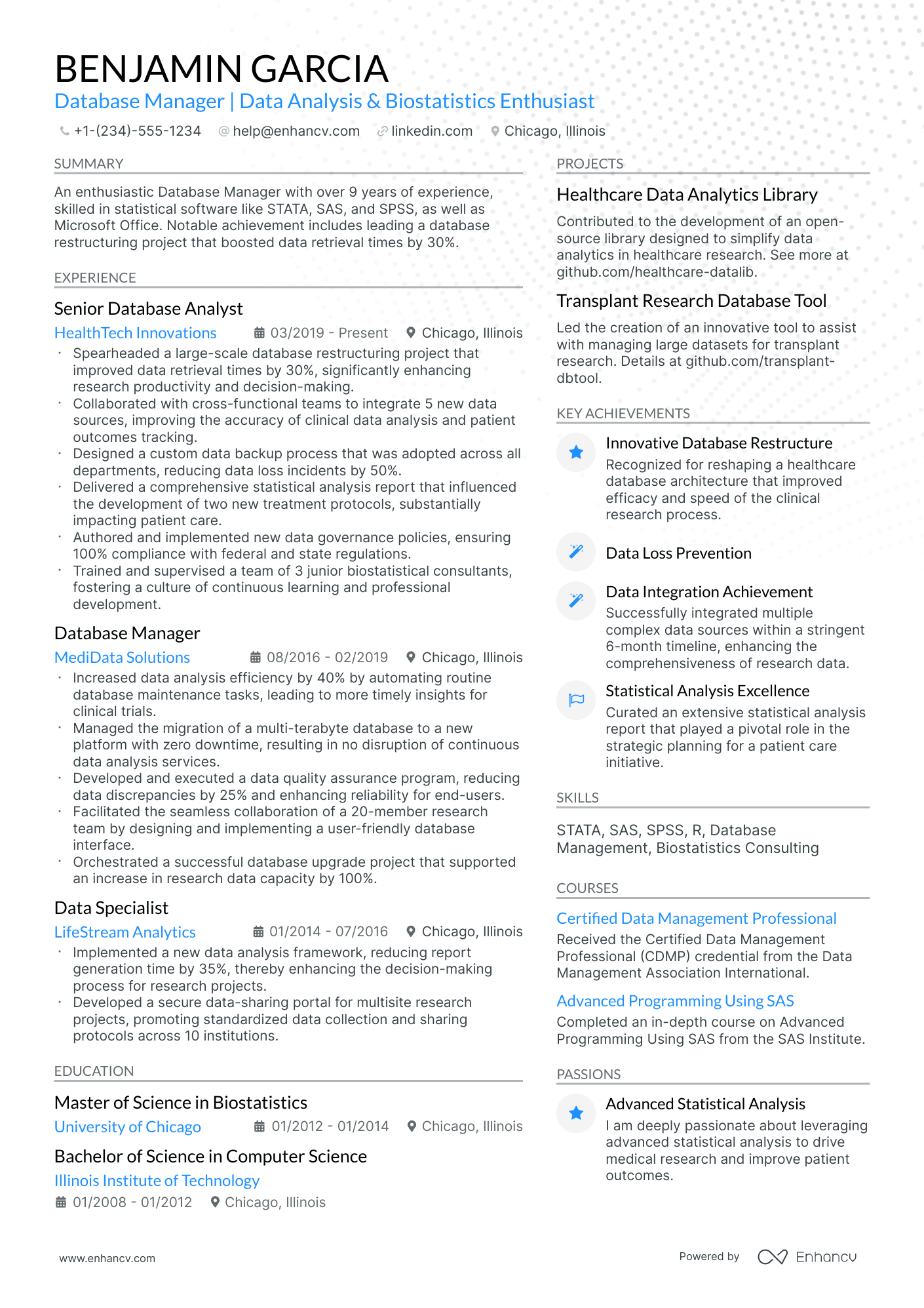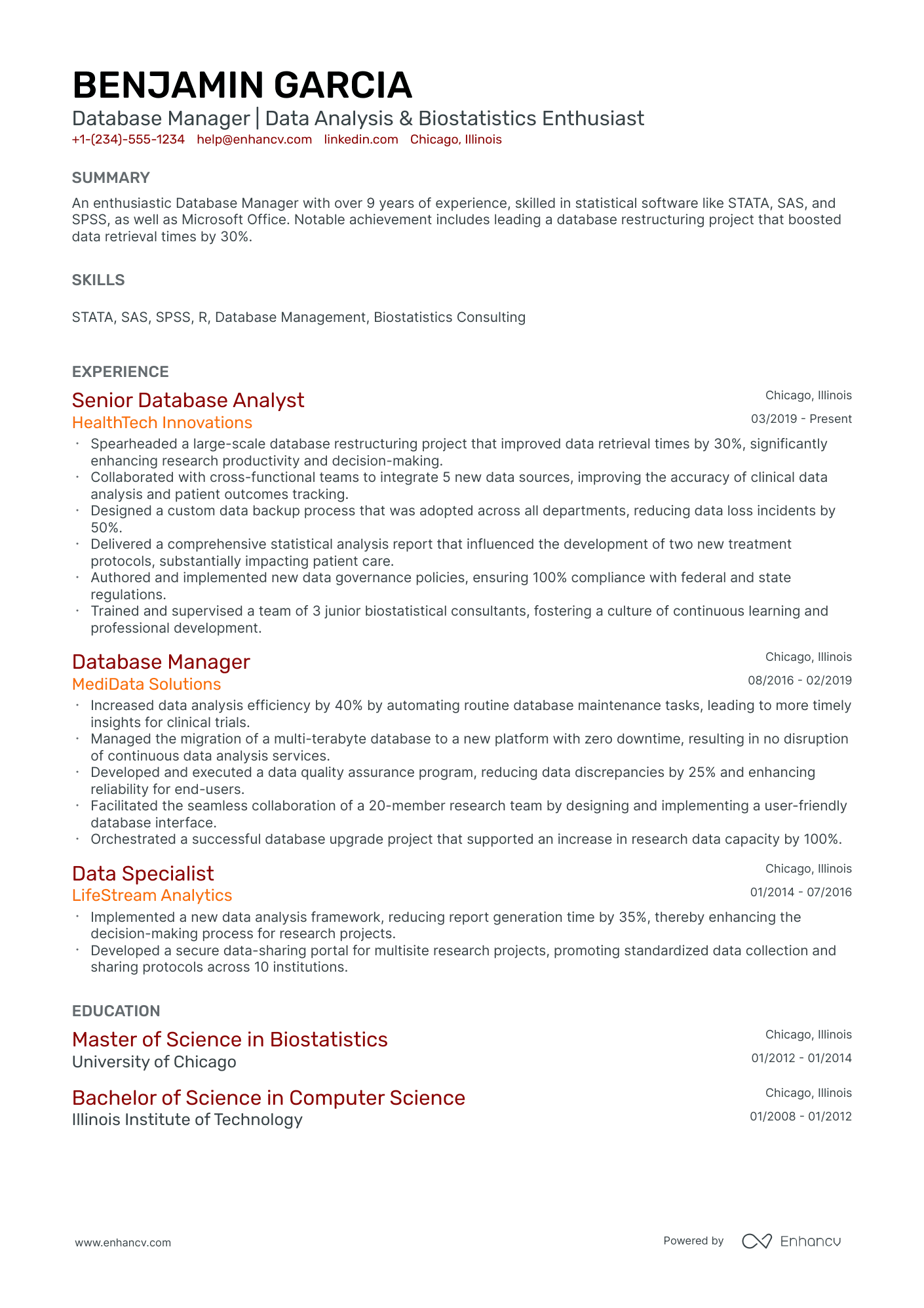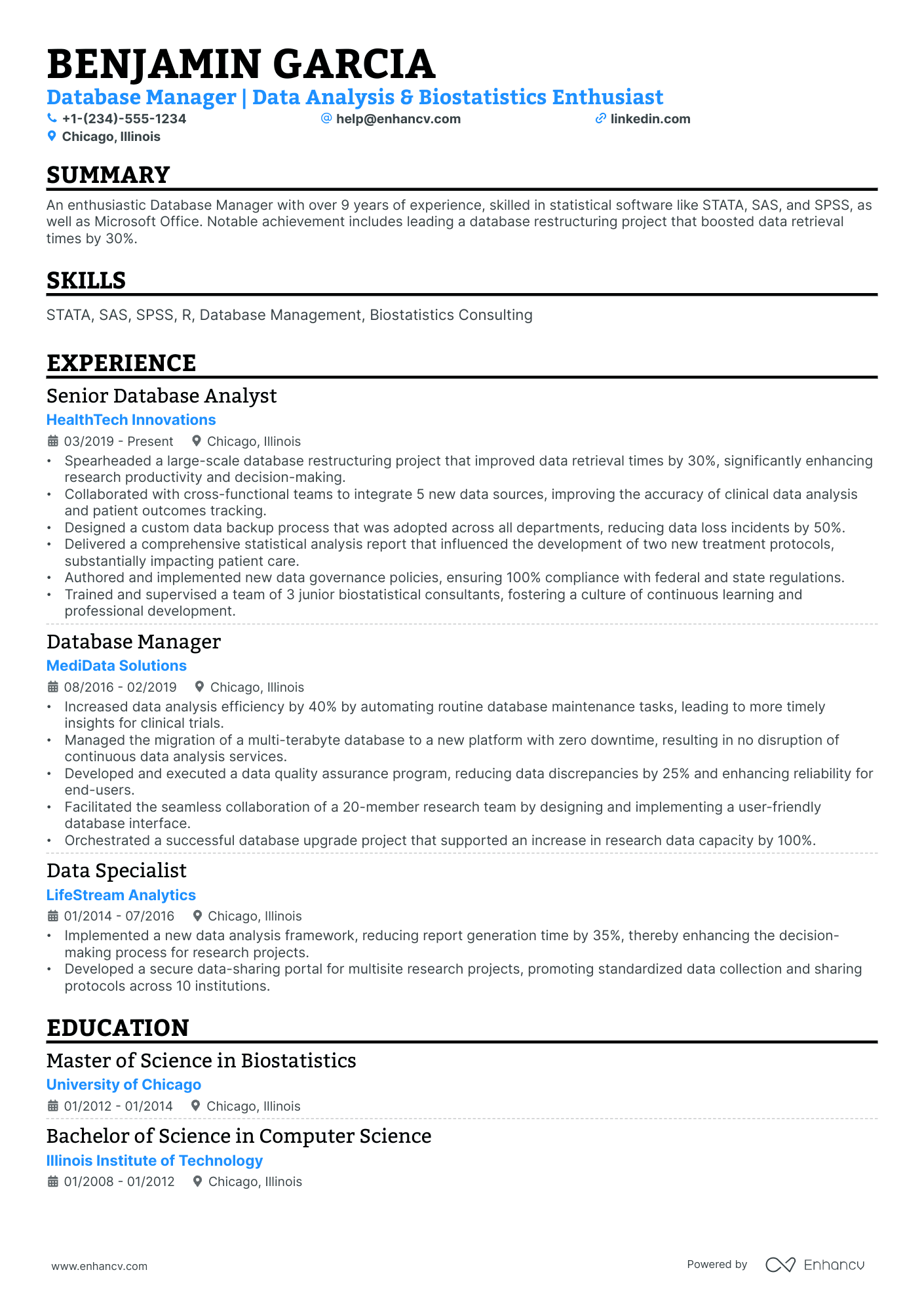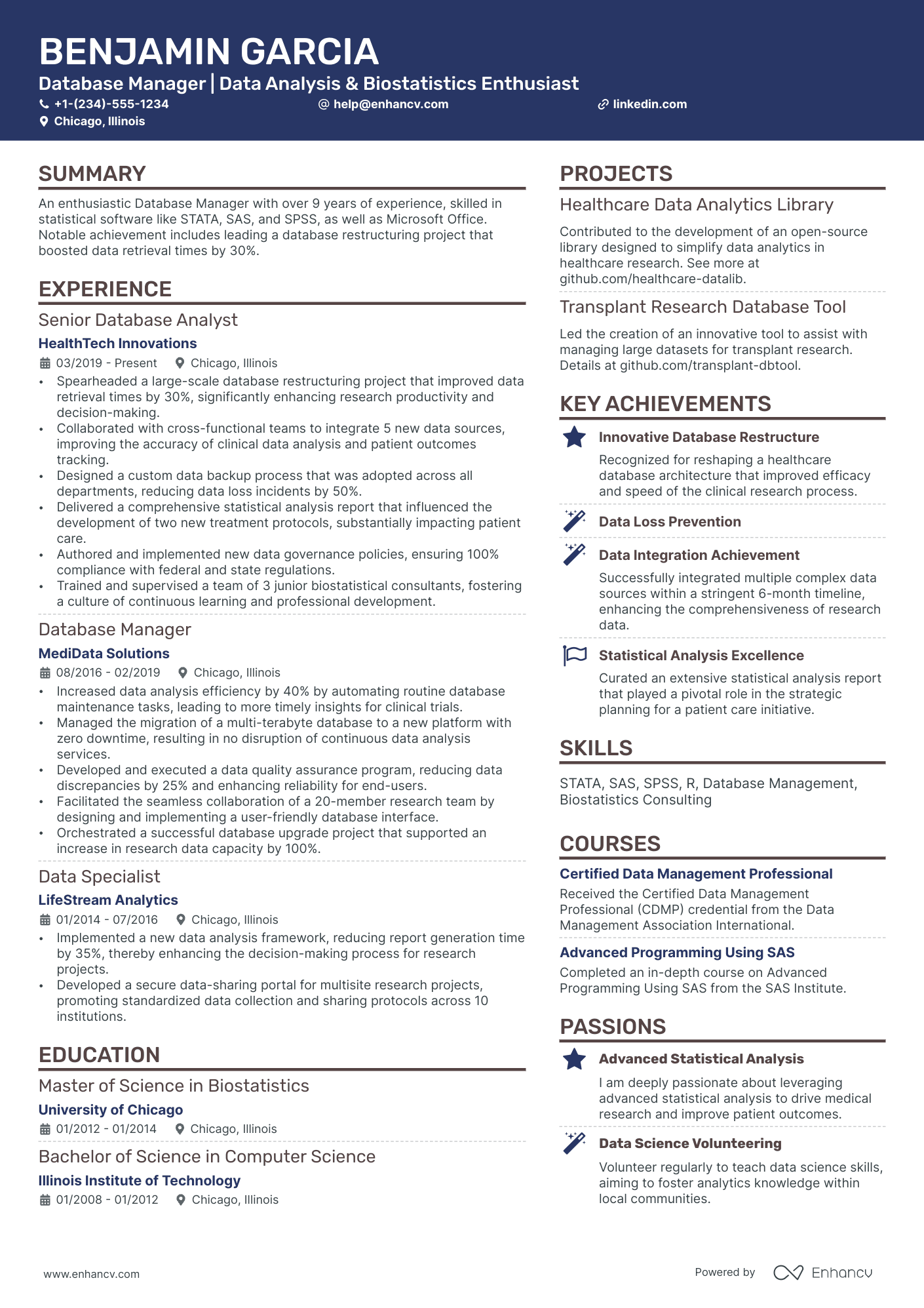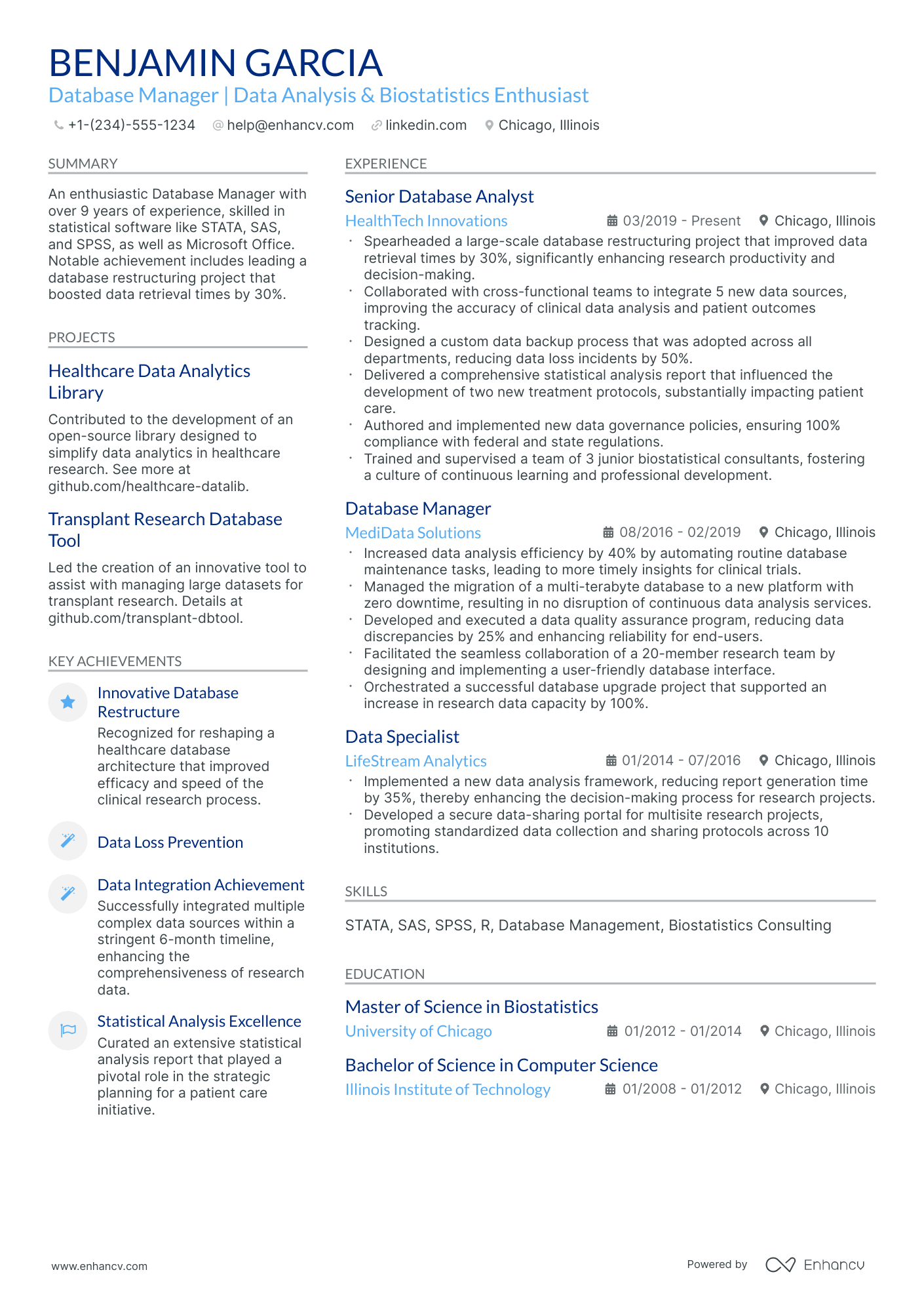As a database manager, articulating the depth of your technical expertise and complex project experience on a single resume can be a daunting challenge. Our comprehensive guide offers tailored strategies to distill your diverse skillset into a compelling narrative that captivates recruiters, positioning you as the undeniable candidate for your next role.
- Database manager resumes that are tailored to the role are more likely to catch recruiters' attention.
- Most sought-out database manager skills that should make your resume.
- Styling the layout of your professional resume: take a page from database manager resume examples.
How to write about your database manager achievements in various resume sections (e.g. summary, experience, and education).
- Data Warehouse Architect Resume Example
- Data Entry Clerk Resume Example
- Database Assistant Resume Example
- Data Specialist Resume Example
- Excel Data Analyst Resume Example
- Data Manager Resume Example
- Enterprise Data Architect Resume Example
- Marketing Data Analyst Resume Example
- Healthcare Data Analyst Resume Example
- Oracle Database Administrator Resume Example
Optimize your database manager resume format to pass the recruiters' assessment
You may be wondering just how much time you need to spend on designing your database manager resume.What recruiters are looking for is systematised content that is clear and coherent. Thus, your database manager resume needs to answer requirements and why you're the best candidate for the role from the get-go.
Often, a clear layout consists of:
- Sorting your experience in the reverse chronological order - starting with your most recent and relevant roles. This is an excellent choice for more experienced professionals;
- Writing your contact information (e.g. personal phone number and email address) and your portfolio or LinkedIn link in your database manager resume header. If you're wondering to include a photo or not, always make sure that it's appropriate for the country you're applying in;
- Use the basic, most important database manager resume sections - your experience, education, summary, etc. Use your resume's real estate wisely to tell a compelling, professional story and match job description's keywords;
- Don't go overboard with the length of your resume. One page is absolutely fine if you happen to have under a decade of relevant experience.
Are you still wondering if you should submit your database manager resume in PDF or Word format ? The PDF has a few more advantages, as it doesn't change the format and the text can't be altered upon application.
Format matters most when your database manager resume is assessed by the Applicant Tracker System (or the ATS).
The ATS parses resumes, looking for specific keywords, skills or experience that match the job description.
P.S. We recently did a study on how the ATS works and were able to demystify three of the biggest misconceptions about how it assesses candidate resumes.
To pass the ATS evaluation, select any of the serif or sans-serif fonts. Popular choices that would help your database manager resume stand out include Raleway, Exo 2, Montserrat, etc.
Most traditionalists go for Arial or Times New Roman, but it's often the case that many candidates choose these fonts, and you'd thus lose points on the uniqueness front.
Upload & Check Your Resume
Drop your resume here or choose a file. PDF & DOCX only. Max 2MB file size.
PRO TIP
Bold the names of educational institutions and certifying bodies for emphasis.
The key to your database manager job-winning resume - present your expertise with these sections:
- A header to make your resume more scannable
- Snapshot of who you are as a professional with your resume soft skills, achievements, and summary or objective
- Job advert keywords in the skills section of your resume
- Resume experience quantifying your past job successes with metrics
- A relevant education, certification, and technical sills section to provide background to your technological/software capabilities
What recruiters want to see on your resume:
- Experience with specific database management systems (e.g., Oracle, SQL Server, MySQL, MongoDB).
- Knowledge of database design principles, data modeling, and schema development.
- Proficiency in SQL and database query optimization techniques.
- Understanding of database security measures and disaster recovery protocols.
- Familiarity with data backup, restoration, and replication methods.
Quick guide to your database manager resume experience section
After deciding on the format of your resume, it's time to organize your experience within the dedicated section.
It's common for database manager professionals to be confused in this part of the process, as they may have too much or little expertise.
Follow the general rules of thumb to be successful when writing this part of your resume:
- The perfect number of bullets you should have under each experience item is no more than six;
- Select not merely your responsibilities, but the most noteworthy achievements for each role that match the job requirements;
- List any certificates or technical expertise you've gained on the job and how they've helped you progress as a professional;
- Carefully select the power verbs to go along with each bullet to avoid generic ones like "managed" and instead substitute those with the actuality of your particular responsibility;
- Integrate valuable keywords from the job advert in the form of achievements under each role you list.
If you're on the search for further advice on how to write your database manager experience section, get some ideas from real-world professional resumes:
- Directed a team of 10 database specialists, overseeing the migration of legacy systems to cloud-based solutions, which enhanced data retrieval times by 40%.
- Spearheaded the integration of advanced database security protocols, reducing potential data breaches and ensuring compliance with GDPR and CCPA regulations.
- Developed and implemented a custom-tailored business intelligence platform utilizing SQL Server, leading to a 30% increase in actionable data insights for strategic decision-making.
- Managed the deployment of a scalable PostgreSQL database environment, facilitating the support of a user base that grew by 200% over 3 years.
- Played a key role in the database design for a new SaaS offering, which resulted in a successful launch with over 5,000 enterprise users in the first six months.
- Collaborated closely with cross-functional teams to optimize query performance, ultimately yielding a 25% improvement in database efficiency across the company.
- Led a critical data cleansing project that eliminated 15% of redundant data and improved the overall data quality for client analytics.
- Orchestrated a company-wide transition to an enhanced data warehousing solution that supported a 50% uptick in concurrent users without compromising performance.
- Customized and deployed database monitoring tools that reduced downtime by 60%, ensuring higher availability for customer-facing applications.
- Revitalized underperforming data processes by introducing an Oracle Exadata solution, bolstering processing speeds for large data sets by over 35%.
- Established and maintained strategic partnerships with software vendors to procure enterprise-level database tools at a 20% cost reduction.
- Implemented comprehensive disaster recovery strategies that decreased potential data loss exposure by 80% and ensured business continuity for core operations.
- Oversaw the complete lifecycle management of NoSQL databases, contributing to a 45% enhancement in system responsiveness and user engagement.
- Devised an entirely new data validation protocol that eliminated historical inaccuracies and improved data integrity for client reports by 90%.
- Identified and amended a critical performance bottleneck in the real-time data analysis process, increasing throughput by 50% for high-priority transactions.
- Formulated and executed a database consolidation strategy that reduced operational costs by 25% while maintaining optimal performance levels.
- Cultivated a culture of continuous improvement, leading to a successful deployment of a company-wide data governance framework that standardized data usage and security.
- Championed the use of predictive analytics models within database systems, enhancing customer segmentation efforts and targeting, which resulted in a 15% uplift in marketing campaign ROI.
- Pioneered the use of distributed databases to allow for higher data redundancy and availability, ensuring 99.9% uptime for business-critical applications.
- Coordinated the successful upgrade of database software across multiple departments, minimizing transition downtime to under 2 hours company-wide.
- Initiated a performance tuning initiative that enhanced database queries, resulting in a 40% decrease in wait times for end-user reporting.
- Implemented a multi-tiered data storage solution maximizing cost-efficiency by intelligently archiving aged data and reducing storage expenditures by 30%.
- Developed a robust ETL process that accelerated data transformation tasks by 60%, enabling near-real-time data availability for analysts.
- Initiated and drove a data literacy program across the organization, leading to a 50% increase in employee proficiency with database tools and reporting software.
- Redesigned company-wide data architecture to support the addition of new data streams, increasing the richness of insights for product development by 35%.
- Managed and mentored a team of junior database administrators, creating a knowledge-sharing environment that reduced onboarding time by 50%.
- Led the database component of a cross-platform mobile application project, ensuring seamless data synchronization across devices and boosting user satisfaction by 20%.
- Launched an automated, machine learning-based data cleaning tool, reducing manual cleaning efforts by 70% and increasing overall data accuracy.
- Championed a database virtualization initiative, which led to a 40% reduction in physical server needs and a corresponding decrease in maintenance costs.
- Collaborated with the business intelligence team to refine data reporting tools, which streamlined the monthly reporting process and slashed report generation time by 50%.
The following content includes information from "O*NET OnLine" by the U.S. Department of Labor, Employment and Training Administration (USDOL/ETA). Used under the CC BY 4.0 license. The data represents the top responsibilities present on the task lists for database manager professionals.
Top Responsibilities for Database Manager:
- Modify existing databases and database management systems or direct programmers and analysts to make changes.
- Plan, coordinate, and implement security measures to safeguard information in computer files against accidental or unauthorized damage, modification or disclosure.
- Plan and install upgrades of database management system software to enhance database performance.
- Specify users and user access levels for each segment of database.
- Test changes to database applications or systems.
- Test programs or databases, correct errors, and make necessary modifications.
- Train users and answer questions.
- Provide technical support to junior staff or clients.
- Approve, schedule, plan, and supervise the installation and testing of new products and improvements to computer systems, such as the installation of new databases.
- Develop standards and guidelines for the use and acquisition of software and to protect vulnerable information.
Quantifying impact on your resume
- Describe the volume of data managed within databases, showcasing the ability to handle large and complex datasets.
- Highlight the number of database instances you have optimized, illustrating efficiency improvements.
- Mention specific percentages of performance improvement after database refinements or migrations.
- Quantify the amount of reduced data processing time due to optimizations or new implementations.
- List the number of users or applications supported by the databases you manage, showing scalability.
- Indicate the frequency of database backups and recovery operations to emphasize reliability and preparedness.
- Specify the number of successful projects led or contributed to, demonstrating project management.
- Detail the amount of cost savings achieved through strategic database management or vendor negotiations.
Action verbs for your database manager resume
What to do if you don't have any experience
It's quite often that candidates without relevant work experience apply for a more entry-level role - and they end up getting hired.
Candidate resumes without experience have these four elements in common:
- Instead of listing their experience in reverse-chronological format (starting with the latest), they've selected a functional-skill-based format. In that way, database manager resumes become more focused on strengths and skills
- Transferrable skills - or ones obtained thanks to work and life experience - have become the core of the resume
- Within the objective, you'd find career achievements, the reason behind the application, and the unique value the candidate brings about to the specific role
- Candidate skills are selected to cover basic requirements, but also show any niche expertise.
Recommended reads:
PRO TIP
If you failed to obtain one of the certificates, as listed in the requirements, but decide to include it on your resume, make sure to include a note somewhere that you have the "relevant training, but are planning to re-take the exams". Support this statement with the actual date you're planning to be re-examined. Always be honest on your resume.
The right balance between hard skills and soft skills for your database manager resume
Wondering what the perfect database manager resume looks like? The candidate's profile meets job requirements by balancing both hard skills and soft skills across their resume.
- Hard skills are all the technologies you're apt at using . Prove you have the right technical background by listing key industry hardware/software in your database manager resume skills section and noteworthy certifications.
- Soft skills are both your personal, mindset, communication, analytical, and problem-solving talents . Use your database manager resume achievements section to show how you've used a particular soft skill to reach a tangible outcome.
When writing about your unique skill set, always make sure to refer back to the job advert to see what are the key requirements. This ensures you've tailored your resume so that it matches closer to what the ideal candidate profile is.
Top skills for your database manager resume:
SQL
Oracle Database
MySQL
Microsoft SQL Server
PostgreSQL
MongoDB
Database Backup and Recovery
Data Modeling
ETL Tools
Database Performance Tuning
Problem Solving
Attention to Detail
Communication
Team Collaboration
Time Management
Critical Thinking
Adaptability
Project Management
Analytical Skills
Decision Making
Next, you will find information on the top technologies for database manager professonals from "O*NET OnLine" by the U.S. Department of Labor, Employment and Training Administration (USDOL/ETA). Used under the CC BY 4.0 license.
Top technologies for Database Manager’s resume:
- Amazon DynamoDB
- Elasticsearch
- Apache Hive
- Blackboard software
- Google Angular
- Spring Framework
PRO TIP
If you're in the process of obtaining your certificate or degree, list the expected date you're supposed to graduate or be certified.
Maximizing your database manager resume: education and certification sections
To effectively showcase your industry knowledge in your database manager resume, it's important to properly list your education and certifications.
For the education section, ensure you include:
- Higher education degrees pertinent to the industry or those at a postgraduate level;
- The start and end dates of your education, along with the name of the institution you graduated from;
- Your GPA and relevant coursework, but only if they are impressive and applicable to the role.
Additionally, create a separate certifications section to spotlight your most notable recognitions. Another excellent place to feature a leading industry certificate is in your resume header, right after your name.
Below is a list of key industry certifications that are often sought after by recruiters
The top 5 certifications for your database manager resume:
- Oracle Certified Professional, MySQL 5.7 Database Administrator (OCP) - Oracle
- Microsoft Certified: Azure Database Administrator Associate (MCADAA) - Microsoft
- IBM Certified Database Administrator - DB2 (IBM DB2 DBA) - IBM
- Certified Data Management Professional (CDMP) - Data Management Association International (DAMA)
- Oracle Database 12c Administrator Certified Professional (OCP) - Oracle
The content below includes information from "O*NET OnLine" by the U.S. Department of Labor, Employment and Training Administration (USDOL/ETA). Used under the CC BY 4.0 license. The data represents the top associations for database manager professionals.
Top US associations for a Database Manager professional
- Association for Computing Machinery
- CompTIA
- Computing Research Association
- IEEE Computer Society
- Institute for Certification of Computing Professionals
PRO TIP
Bold the names of educational institutions and certifying bodies for emphasis.
Recommended reads:
Which one to use: a resume summary or a resume objective?
The database manager resume summary or objective serves as a good introduction to your experience for recruiters.
Have you ever wondered which one (the summary or objective) will be more appropriate for your database manager resume?
- If you are a less experienced professional, write a resume objective statement. The objective is about three sentences long and provides recruiters with information about your career goals, strengths, and achievements . It should basically denote how you see yourself in this particular role, and what is your relevant experience and/or know-how;
- If you happen to have plenty of relevant experience, select your most impressive achievements for your resume summary. The summary is no longer than five sentences and serves as a storytelling instrument - highlighting your greatest career wins . Don't forget to align your summary with the job requirements to ensure your resume stays relevant to the role.
Read on for more information and examples of resume summaries and objectives from real world professionals.
Resume summaries for a database manager job
- With over a decade of database management experience at Fortune 500 companies, this seasoned professional has mastered SQL, data analytics, and performance tuning, and orchestrated the successful migration of multi-terabyte databases to cloud infrastructure, resulting in a 20% cost savings and improved data accessibility for remote teams.
- Former IT consultant with extensive expertise in systems analysis and software development pivots to database management, bringing forward a strong proficiency in Oracle and Python, with a proven track record of enhancing data security and system efficiency in previous roles.
- A recent computer science graduate eager to apply theoretical knowledge and a fresh perspective to database management tasks, looking to leverage strong analytical skills, foundational understanding of MySQL and NoSQL databases, and a passion for optimizing data processing and storage systems.
- With a background in financial analytics and a keen understanding of the importance of reliable data, this emerging database manager is enthusiastic about transferring skills like data visualization and statistical analysis to ensure accurate, timely, and secure information management, backed by 2 years of experience with relational databases in a commercial setting.
- As a growing expert with 5 years in sales and inventory management systems, now specializing in database management, strategically utilizes business acumen, alongside technical skills in Microsoft SQL Server and ETL processes, to drive substantial improvements in data handling efficiency and accuracy, fostering enhanced decision-making capabilities.
- A meticulous and forward-thinking individual seeks to start a career in database management, aiming to employ a passion for technology and problem-solving, an eagerness to learn cutting-edge database platforms, and a strong desire to contribute to the achievement of operational excellence in data-driven environments.
Average salary info by state in the US for Database Manager professionals
Local salary info for Database Manager.” Source: My Next Move, National Center for O*NET Development. Accessed 10/15/2024
| State | Average Salary (in USD) |
|---|---|
| US National Average | $101,510 |
| California (CA) | $112,170 |
| Texas (TX) | $102,010 |
| Florida (FL) | $102,280 |
| New York (NY) | $98,110 |
| Pennsylvania (PA) | $97,100 |
| Illinois (IL) | $96,560 |
| Ohio (OH) | $94,510 |
| Georgia (GA) | $104,000 |
| North Carolina (NC) | $104,990 |
| Michigan (MI) | $97,760 |
Recruiters' favorite additional database manager resume sections
When writing your database manager resume, you may be thinking to yourself, " Is there anything more I can add on to stand out? ".
Include any of the below four sections you deem relevant, to ensure your database manager resume further builds up your professional and personal profile:
Key takeaways
We trust that this Enhancv guide has been informative and useful. To summarize the essential points:
- Opt for a simple and readable format, focusing more on your database manager achievements rather than just duties;
- Emphasize your accomplishments in the database manager experience section over mere responsibilities;
- If lacking relevant experience, utilize various resume sections like education and volunteering to demonstrate your suitable skill set;
- Never overlook the significance of pertinent higher education, training, and certifications;
- Incorporate diverse sections in your resume to highlight not just your skills expertise but also your personality.
